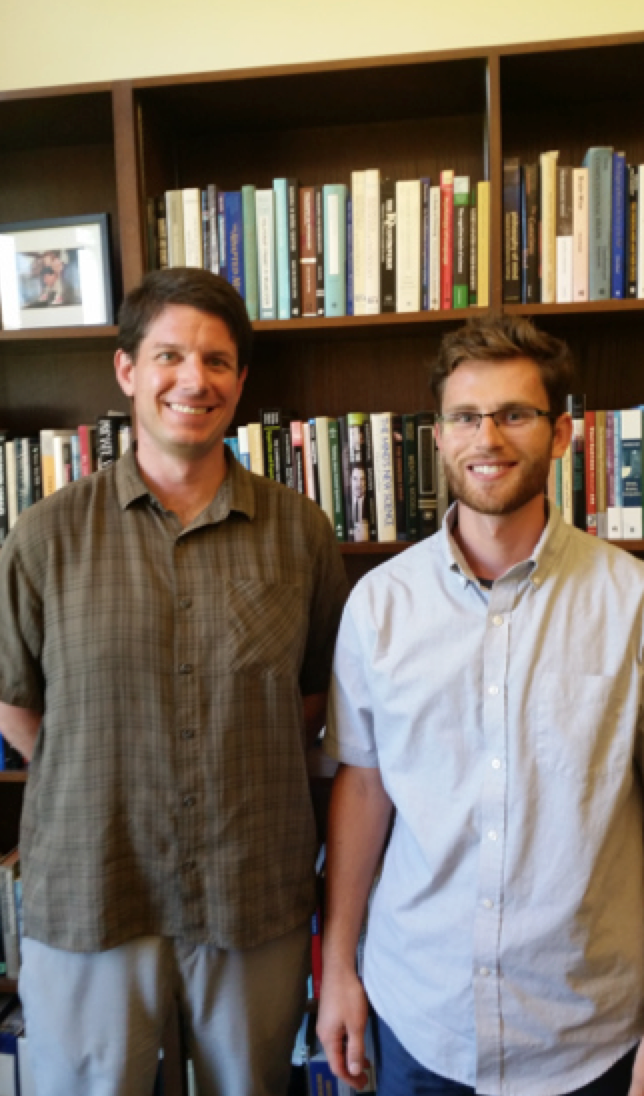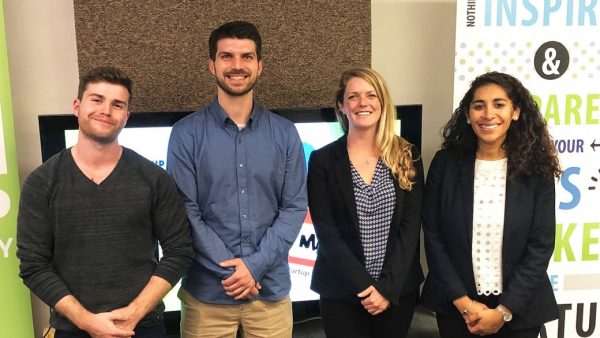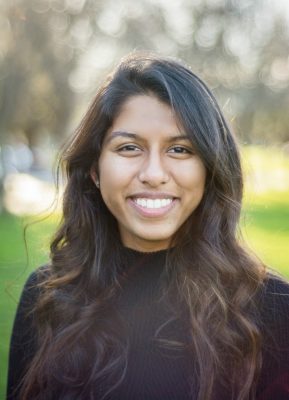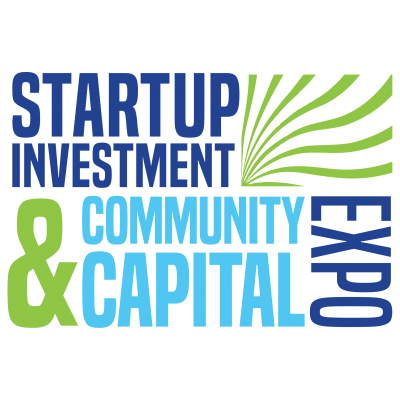Featured
Q&A: CSUMB student falls into amazing summer research program at Carnegie Mellon

By Sara Isenberg
Founder, Publisher, Editor-in-Chief, Santa Cruz Tech Beat
August 16, 2018 — Santa Cruz, CA
(Photo above: CSUMB undergraduate Tim Geary, right, stands with Carnegie Mellon University professor and mentor, Dr. David Danks, left, in Danks’ CMU office in Pittsburgh, PA. Contributed.)
CSUMB student, Tim Geary, fell into an interesting — amazing, productive, unique — summer research program at Carnegie Mellon University (CMU).
“Incredible opportunities arise when you take action,” says Geary. Here’s his story.
SCTB: Sounds like you had a fantastic experience over the summer, and I’d love to hear some of the details. First, what are you studying? Tell us a bit about yourself.
TG: I am currently majoring in Humanities and Communication at CSUMB with a concentration in practical and professional ethics, and will be graduating in Fall 2019. I played tennis competitively at Cabrillo College for two years. As well, I play and teach piano. I grew up in Monterey with six homeschooled brothers and sisters. We lived in the rural farmland area of Moss Landing and were free to roam and unleash our full creativity.
SCTB: Last spring you made a unique connection to CMU. How did that happen?
TG: The first part started after acceptance into CSUMB Undergraduate Research Opportunities Center (UROC). UROC trains undergraduates how to conduct research, land research experiences, and prepares them for graduate school. I connected with CMU by searching academic databases for interesting studies in Artificial Intelligence (A.I.) Ethics. I ran across an article that highlighted CMU’s role as a leader in A.I and announced $10,000,000 of funds to research ethical issues posed by A.I. I then went to CMU’s Ethics and policy programs and contacted David Danks, head of the Philosophy Department with a Statement of Interest email. This email included who I was, what I studied, why I was interested in this research, and how this research helps me pursue future goals and aspirations. I also linked an academic resume which highlighted any academic achievements.
Dr. Danks said yes, and wanted to start a summer project on Autonomous Vehicles (AVs) the following week after Spring classes ended. This connection was unique and taught me that incredible opportunities arise when you take action and contact researchers directly. Many research experiences are set up through an REU (Research Experience for Undergraduates) program. However, Dr. Danks accepted me to work under his guidance on a completely new project without the ties of a traditional REU program.
SCTB: You told me another time that you’d never been back east before.
TG: Going back east opened my eyes to the tough rugged American beginnings. There is a totally different feel from the Bay Area. Pittsburgh was primarily a steel town and helped shape and build America as we know it. I not only did research on A.I., but also engaged in the local culture and history by exploring local hangouts, visiting Pitt University, and walking through time in the Carnegie Museum of Art and Natural History.
SCTB: What did you do in your seven week research program?
TG: Dr. Danks clearly stated this seven week experience is about learning how to research and shadow someone such as himself who researches for a living. I arrived May 22 (2018) and Dr. Danks and I explored potential topics of research under the umbrella of A.I. technologies. As an Uber driver, I was particularly interested in Autonomous Vehicles. These interests also aligned with Danks’ primary research over the past five years. After we agreed on an area of research, Danks assigned me the task of creating question trees.
- The first week I created potential questions to answer. The question tree grew off this one question: “How, if at all, will autonomous vehicles lower the annual death rate?” Based off this one question, there where numerous other questions that must be addressed relating to current road statistics and possible futures.
- The second week consisted of answering all the questions with credible data and research studies. I soon found out that proponents AV predict numerous benefits of these vehicles. Dr. Danks assigned me the task of gathering all the reasons and justifications for each benefit. These benefits fall under two categories. One, safety and efficiency (reduced fatalities, emissions, traffic, and parking structures), and two, self-determination benefits (increased access for disabled populations, and productivity).
- The third week, Dr. Danks and I asked a new question. “When, If at all, can we have all the benefits of AVs given the tension between categories of safety and self-determination benefits, and how, if at all, can this tension be mitigated to lead to most or all benefits?” As mentioned before, Danks wanted to show me how a researcher thinks. He showed me how to answer this question and outlined an argument for a publication. I was then assigned the task of writing the argument section of a publication.
- The fourth and fifth weeks consisted of struggling through writing and gathering data. This was the most challenging part of the research project. The draft section was all marked in red and it was back to the drawing board.
- Weeks six and seven, I met with Dr. Danks and we mapped out the argument again and set writing targets.
- Overall, this program walked me through the basics of research. Choose an area of interest. Ask questions. Answer them and find ways to support your answer. If your answer is new and unique (and backed up with evidence) you have added to the body of knowledge. Find a way to convey your findings in multiple formats (poster, speech, and journal publication). Finally, identify future work to build on your study.
SCTB: Sounds like an amazing academic experience! Any surprises?
TG: I was surprised by CMU’s atmosphere of interdisciplinary work in action. My primary mentor and head of the Philosophy Department, Dr. Danks, works at the intersection of philosophy, psychology, and machine learning. I was introduced to Alex John London, Director of Ethics, History, and Public Policy. I then met with Martial Hebert, head of the Robotics Institute. These three world class experts all work together on the same problems. As mentioned before, this is what makes CMU so unique as a world leader in policy, business, and tech. In many ways this is related to CSUMB’s vision statement and gives a perfect exemplar.
There was not much to dislike about this experience. One difficulty was how busy my mentor was with travels. I would go for two weeks without meeting and that proved challenging given I never did research before.
Something I did not expect was just how interdisciplinary CMU is. Many institutions include this as a goal, but few carry it out.
SCTB: You mentioned to me that you kept a detailed blog and that it was a key element of your research process.
TG: A blog boosts thinking and problem solving and also gives you something to look back on as you grow. To write powerful memorable posts, I created raw writing materials from daily journaling in google docs. These daily entrees included anything and everything that happened that day (meetings, work, problems, problem solving, frustrations, good/bad habits, and brainstorming for research and writing the next day). I took everything from seven days of journaling and condensed it into a professional weekly post highlighting the research process.
SCTB: How will this experience help you fine-tune your career direction?
TG: I am still working out details and educational path. Most likely I’m headed to a Masters in communications but I’m also considering another bachelor’s degree in economics followed by an MBA. Ultimately, I want to give back at a global level and apply these experiences to motivate others. A hybrid graduate degree in philosophy and artificial intelligence at CMU is another promising path, as well. This experience opened the door to work in multiple fields. I now see a technical direction combined with my program at CSUMB.
SCTB: How did your education at CSUMB contribute to your success in this program?
TG: The incredible HCOM (School of Humanities and Communications) degree built a strong foundation of writing, speaking, and interpersonal skills. This degree prepared me for this research. Hands down, one of the best programs.
CSUMB’s vision says “Our graduates will have an understanding of interdependence and global competence, distinctive technical and educational skills, the experience and abilities to contribute to California’s high quality work force, the critical thinking abilities to be productive citizens, and the social responsibility and skills to be community builders.” This prepared me for my research experience at Carnegie Mellon. CMU is a place where this mission is truly acted out.
CSUMB and UROC both prepared me for this experience. Excelling in this research placement and sharing this experience with fellow peers gives me a way to give back and bolster CSUMB and UROC’s reputation.
SCTB: Do you have any suggestions for other students on how to make the most of a summer research program?
TG: Yes:
- Know your mentor’s work, background and interests. You are there to learn, not show them what you know. Prepare for each meeting and do exactly what they tell you to do. Follow directions and do not add anything fancy. Finish the job first and then add a few suggestions after you do what you were asked to do.
- Look forward to mistakes and learn from them. Do not dwell on mistakes, keep moving forward. My current internship mentor in Santa Cruz, Jeff Swall, taught me that “It is ok to make mistakes, but not the same one twice.”
- There are different ways to get research and internship experiences. Think outside of the box and contact these people directly. First you must know why you’re interested in the area and how you can add to the experts research. Teachers love their research for a reason, and if you show interest and a willingness to learn, they will give you a shot. Go for it!
###
If you wish to republish this article, please follow our Terms of Use.
###
Tagged CSUMB, Internships








